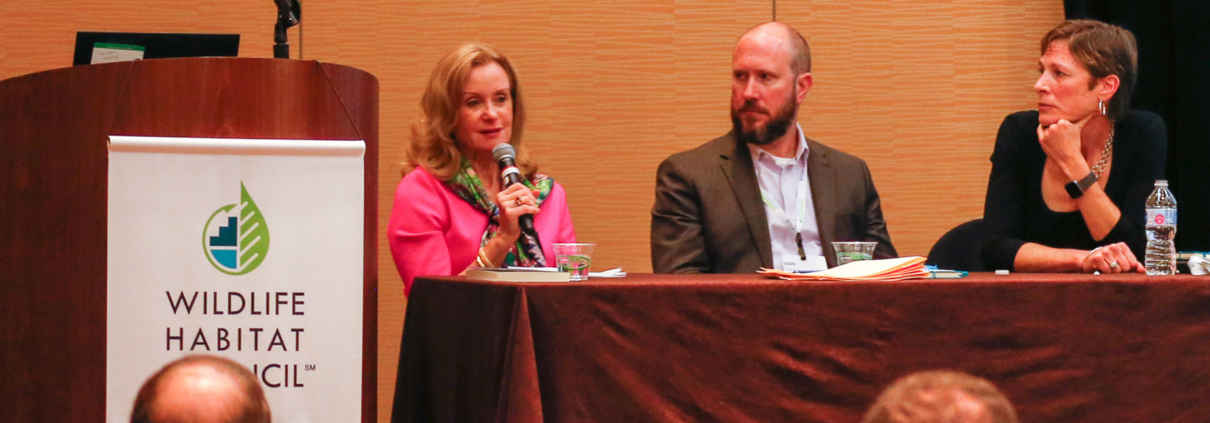A Magic Wand for Sustainable Improvements? The Tax Cut and Jobs Act as a Conservation Support – A Conservation Conference Recap
At the heart of our mission, WHC empowers companies to manage habitat on their lands. One of the ways in which we do so is though the sharing of technical knowledge and strategic advice, enabling businesses make the right decisions for their company, employees and the communities they work in.
At the 2018 Conservation Conference, Laurie Davies Adams, President and CEO Emeritus of the Pollinator Partnership and WHC Board Member presented a look at the new Tax Act and how it can correlate with conservation activities. The following is Laurie’s narrative of her presentation.
As 2019 starts, it can be tempting to retreat from environmentally sustainable actions as, amid the various swings in the news cycle, the environment can take a back seat to other headline-stealing stories. Fear not! The world of sustainability is the future, and that future begins right now at the beginning of 2019. Smart and forward-thinking environmentally-conscious individuals and corporations will take advantage of every opportunity to build a more sustainable and profitable future – and 2019 has some unique and vital prospects through the Tax Cut and Jobs Act (TCJA), passed in 2017.
The new tax climate in the U.S. affords the chance to make a real difference now and in the future. Never thought of the TCJA as a conservation law? Of course, it wasn’t the original intent, but there are many ways to look at the law, and it provides a couple of chances to finance conservation measures at a considerable savings.
Let’s start with the most obvious result of the TCJA – the corporate tax rate overall has fallen from 35% to 21% in most cases. This brings new fluidity to the cash flows of major corporations. Couple this with the ability to take a 100% depreciation deduction starting at the beginning of an acquisition, and cash flows improve even more. What to do with this extra cash? Obvious actions have included buying back stock, adding workers and improving wages, but one significant new prospect is to invest in long-term sustainability through capital improvements that will pay itself back in lowered operating costs and a reduced carbon footprint.
What could this mean for the economics of corporate operations? Solar panels reduce energy costs; native landscaping reduces water and maintenance costs; advanced pollution controls reduce the carbon footprint, promote compliance with carbon reduction goals and preserve the environment for employees, customers and the communities in which we operate. The extra cash, adjusted depreciation and improved cash flow afforded by the Tax Cut and Jobs Act make projects that heretofore did not pencil out now make economic sense in both the short and long term.
The TCJA has another distinct advantage that conservationists can capitalize on, and here is where things get interesting – Opportunity Zones or, as I like to say, “A Trip to Oz.” A Qualified Opportunity Zone (QOZ) is an economically-distressed community where new investments in a Qualified Opportunity Fund (QOF), under certain conditions, may be eligible for preferential tax treatment. QOFs invest in designated Opportunity Zones – census tracts identified by each governor in early 2018 and approved by the Department of the Treasury. These census tracts make up nearly 12% of the U.S. and have the lowest median income in each state – hence, they are areas ripe for capital investment and job creation. The Tax Cut and Jobs Act rewards investors who invest in Opportunity Zones in three distinct ways:
- Realized capital gain from any previous transaction that is invested in a QOF automatically gets a deferment on capital gains tax. The investment must be made within a certain time period and the tax still needs to be paid, but it can be deferred by remaining in an QOF invested in capital improvement in the Opportunity Zone. This deferment gives the investor latitude to invest that tax money in other projects immediately. This can mean up to a 72% increase in the overall cash flow as a result.
- If the realized capital gain is held in the QOF for 7 years, the tax will come due, but at a rate 15% lower than it would have been originally. It is, in essence, a free pass for 15% of the tax, allowing more available capital to be places in projects.
- If the money is held in the QOF investment for 10 years and invested in a capital improvements within the Opportunity Zone, you can sell the project/property/investment, and any gain on the transaction can be tax free. That makes it even more attractive to add improvements like modern HVAC and insulation, pollution controls and more environmentally and economically savvy improvements. These improvements will pay off as you operate the business and though they improve the property, when you sell it after 10 years, there is no tax on the gain that these improvements have wrought.
As with any capital investments, these opportunities warrant a coordinated effort among the real estate, sustainability and finance heads of any corporation, and since the regulations governing these investments are very complicated, it is essential to consult a tax professional to ensure compliance and maximum benefit. Though the rules are complex, the opportunity inherent in the Opportunity Zone is significant – AND, it offers more than a simple real estate development would; it gives the chance to make 21st century decisions about sustainability that will pay off in multiple ways – especially around sustainable improvements that may not have made sense under the old system.
Qualified Opportunity Funds are a unique opportunity to develop a sustainable project from the ground up in communities that will benefit the most – with an extra boost from the federal government. While conservation was never mentioned in the TCJA, it is also not prohibited by the structure of the Act – and it is an opportunity that even the Wizard of Oz couldn’t have cooked up as a means to take care of business while taking good care of our “No place like home,” planet earth.
Read more WHC blogs.
Wildlife Habitat Council does not provide tax, legal or accounting advice. This material has been prepared for informational purposes only, and is not intended to provide, and should not be relied on for, tax, legal or accounting advice. You should consult your own tax, legal and accounting advisors before engaging in any transaction.



